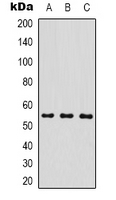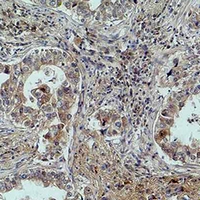Anti-MICU1 Antibody
Mouse monoclonal antibody to MICU1
- SPECIFICATION
- CITATIONS
- PROTOCOLS
- BACKGROUND

Application
| WB, IHC |
|---|---|
| Primary Accession | Q9BPX6 |
| Reactivity | Human, Mouse, Rat |
| Host | Mouse |
| Clonality | Monoclonal |
| Calculated MW | 54351 Da |
| Gene ID | 10367 |
|---|---|
| Other Names | CALC; CBARA1; Calcium uptake protein 1 mitochondrial; Atopy-related autoantigen CALC; ara CALC; Calcium-binding atopy-related autoantigen 1; allergen Hom s 4 |
| Target/Specificity | Recombinant protein corresponding to human MICU1. |
| Dilution | WB~~WB (1/1000 - 1/2000), IH (1/100 - 1/200) IHC~~1:100~500 |
| Format | Liquid in 0.42% Potassium phosphate, 0.87% Sodium chloride, pH 7.3, 30% glycerol, and 0.09% (W/V) sodium azide. |
| Storage | Store at -20 °C.Stable for 12 months from date of receipt |
| Name | MICU1 {ECO:0000303|PubMed:20693986, ECO:0000312|HGNC:HGNC:1530} |
|---|---|
| Function | Calcium sensor of the mitochondrial calcium uniporter (MCU) channel, which senses calcium level via its EF-hand domains (PubMed:20693986, PubMed:23101630, PubMed:23747253, PubMed:24313810, PubMed:24332854, PubMed:24503055, PubMed:24560927, PubMed:26341627, PubMed:26903221, PubMed:27099988, PubMed:28615291, PubMed:30454562, PubMed:30638448, PubMed:32494073, PubMed:32667285, PubMed:32762847, PubMed:32790952, PubMed:34463251, PubMed:36206740, PubMed:37036971, PubMed:37126688). MICU1 and MICU2 (or MICU3) form a disulfide-linked heterodimer that stimulates and inhibits MCU activity, depending on the concentration of calcium (PubMed:24560927, PubMed:26903221, PubMed:28615291, PubMed:32148862, PubMed:32494073, PubMed:32667285, PubMed:32762847, PubMed:32790952, PubMed:36206740, PubMed:37036971, PubMed:37126688). At low calcium levels, MICU1 occludes the pore of the MCU channel, preventing mitochondrial calcium uptake (PubMed:32494073, PubMed:32667285, PubMed:32762847, PubMed:37036971, PubMed:37126688). At higher calcium levels, calcium-binding to MICU1 and MICU2 (or MICU3) induces a conformational change that weakens MCU-MICU1 interactions and moves the MICU1-MICU2 heterodimer away from the pore, allowing calcium permeation through the MCU channel (PubMed:32494073, PubMed:32667285, PubMed:32762847). Also required to protect against manganese toxicity by preventing manganese uptake by MCU: mechanistically, manganese- binding to its EF-hand domains does not induce any conformational change, maintaining MCU pore occlusion (PubMed:30082385, PubMed:30403999). Also acts as a barrier for inhibitors of the MCU channel, such as ruthenium red or its derivative Ru360 (PubMed:37244260). Acts as a regulator of mitochondrial cristae structure independently of its ability to regulate the mitochondrial calcium uniporter channel (PubMed:31427612, PubMed:37098122). Regulates glucose-dependent insulin secretion in pancreatic beta-cells by regulating mitochondrial calcium uptake (PubMed:22904319). Induces T- helper 1-mediated autoreactivity, which is accompanied by the release of IFNG (PubMed:16002733). |
| Cellular Location | Mitochondrion intermembrane space. Mitochondrion inner membrane. Note=Recruited to the mitochondrial inner membrane by EMRE/SMDT1 (PubMed:30454562). Also localizes to mitochondrial cristae junctions (PubMed:31427612) |
| Tissue Location | Expressed in epithelial cell lines. Strongly expressed in epidermal keratinocytes and dermal endothelial cells |

Thousands of laboratories across the world have published research that depended on the performance of antibodies from Abcepta to advance their research. Check out links to articles that cite our products in major peer-reviewed journals, organized by research category.
info@abcepta.com, and receive a free "I Love Antibodies" mug.
Provided below are standard protocols that you may find useful for product applications.
Background
Recombinant protein corresponding to human MICU1.
If you have used an Abcepta product and would like to share how it has performed, please click on the "Submit Review" button and provide the requested information. Our staff will examine and post your review and contact you if needed.
If you have any additional inquiries please email technical services at tech@abcepta.com.













 Foundational characteristics of cancer include proliferation, angiogenesis, migration, evasion of apoptosis, and cellular immortality. Find key markers for these cellular processes and antibodies to detect them.
Foundational characteristics of cancer include proliferation, angiogenesis, migration, evasion of apoptosis, and cellular immortality. Find key markers for these cellular processes and antibodies to detect them. The SUMOplot™ Analysis Program predicts and scores sumoylation sites in your protein. SUMOylation is a post-translational modification involved in various cellular processes, such as nuclear-cytosolic transport, transcriptional regulation, apoptosis, protein stability, response to stress, and progression through the cell cycle.
The SUMOplot™ Analysis Program predicts and scores sumoylation sites in your protein. SUMOylation is a post-translational modification involved in various cellular processes, such as nuclear-cytosolic transport, transcriptional regulation, apoptosis, protein stability, response to stress, and progression through the cell cycle. The Autophagy Receptor Motif Plotter predicts and scores autophagy receptor binding sites in your protein. Identifying proteins connected to this pathway is critical to understanding the role of autophagy in physiological as well as pathological processes such as development, differentiation, neurodegenerative diseases, stress, infection, and cancer.
The Autophagy Receptor Motif Plotter predicts and scores autophagy receptor binding sites in your protein. Identifying proteins connected to this pathway is critical to understanding the role of autophagy in physiological as well as pathological processes such as development, differentiation, neurodegenerative diseases, stress, infection, and cancer.



